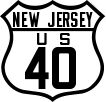 |
George Washington
1732-1799
George Washington played an important role in the establishment of the National Road. In April 1754, on his way to establish a post at the Forks of the Ohio (the current site of Pittsburgh), Washington learned that the French had already erected a fort there. Warned that the French were advancing, he quickly threw up fortifications at Great Meadows, Pennsylvania, aptly naming the entrenchment Fort Necessity, and marched to intercept advancing French troops. In the resulting skirmish the French commander the sieur de Jumonville was killed and most of his men were captured. Washington pulled his small force back into Fort Necessity where he was overwhelmed (July 3, 1754) by the French in an all-day battle fought in a drenching rain. Surrounded by enemy troops, with his food supply almost exhausted and his dampened ammunition useless, Washington capitulated. Under the terms of the surrender signed that day, he was permitted to march his troops back to Williamsburg.
Discouraged by his defeat and angered by discrimination between British and colonial officers in rank and pay, he resigned his commission near the end of 1754. The next year, however, he volunteered to join British general Edward Braddock's expedition against the French. When Braddock was ambushed by the French and their Indian allies on the Monongahela River, Washington, although seriously ill, tried to rally the Virginia troops.
View user comments below.
For more information:
No comments have been posted.
Feedback: Do you have corrections or contributions for this page? Want to make a suggestion? Click here to send me an e-mail. I am espcially interested in memories, stories, postcards and photographs. Thanks!

Last updated: 2010-09-06 15:34:52 |
 |
|


|
|






























